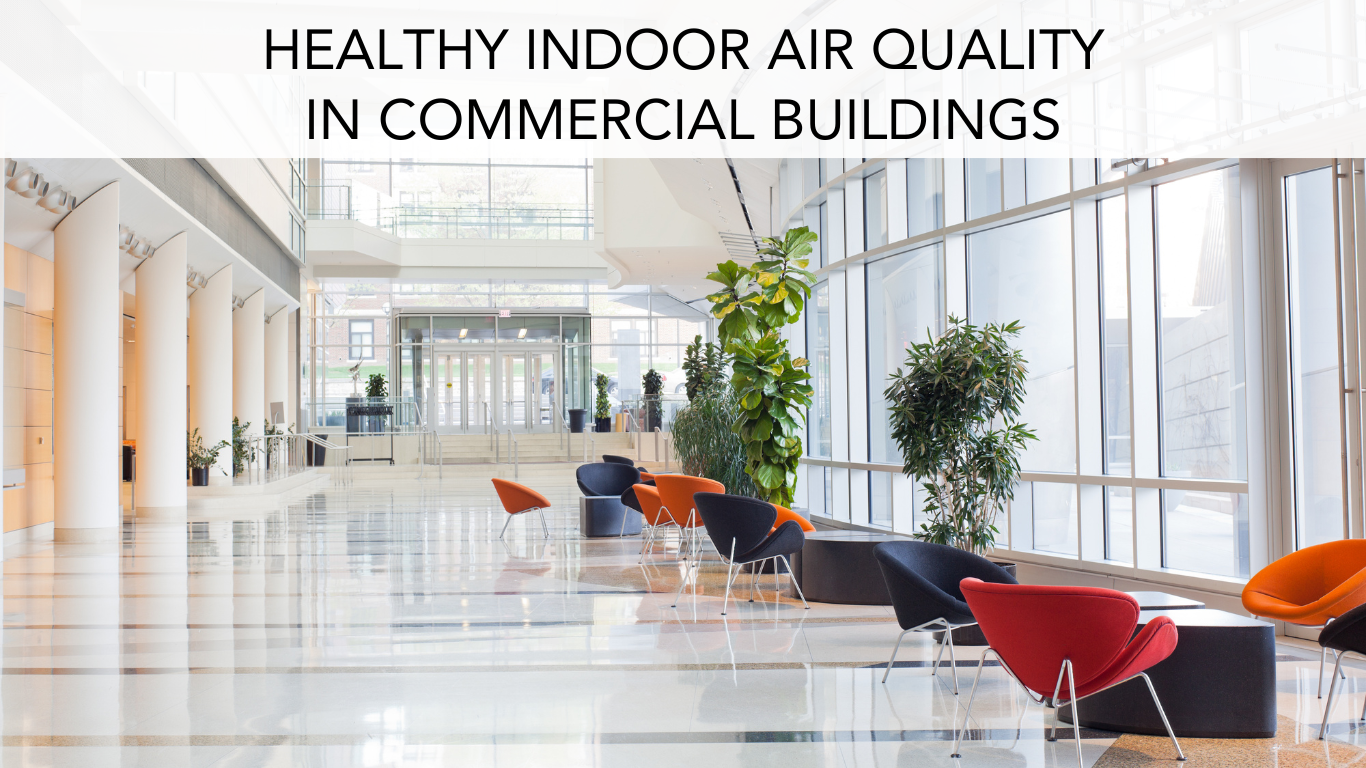Healthy Indoor Air Quality in Commercial Buildings

The Importance and Benefits of Healthy Indoor Air Quality in Commercial Buildings
Indoor air quality (IAQ) is a critical yet often overlooked aspect of commercial building management. With employees, clients, and visitors spending a significant portion of their time indoors, the quality of air within these environments can profoundly impact health, productivity, and overall well-being. Over the past several decades commercial buildings have undergone substantial changes associated with better, lighter construction materials, more sophisticated HVAC systems, and increased energy efficiency by creating tighter, more sealed buildings. These changes impact and change the indoor environment, particularly air quality.
Health Implications
Poor IAQ in commercial buildings can lead to various health issues, ranging from minor irritations to serious conditions. Common pollutants include volatile organic compounds (VOCs), mold spores, carbon dioxide and carbon monoxide, radon, particulate matter and ozone, as well as unidentifiable nuisance odors. Exposure to these pollutants can cause mild discomfort, including but not limited to, sore throat, respiratory allergies, headaches, and fatigue. Sensitive individuals can also experience heightened reactions within a space as compared to most of the occupants. In more severe cases, long-term exposure to certain pollutants can lead to chronic conditions such as asthma, cardiovascular diseases, and even cancer.
The presence of building specific conditions like poor IAQ, building dampness, mold and bacteria can exacerbate health issues and potentially lead to temporarily heightened health issues. Symptoms typically improve after leaving the building, indicating a direct correlation between IAQ and health.
Productivity and Comfort
IAQ directly affects productivity and comfort levels. Poor air quality can lead to decreased concentration, increased absenteeism, and lower overall productivity. Conversely, a well-ventilated and clean environment can enhance cognitive function and workplace efficiency. Employees working in environments with good air quality, in addition to proper lighting, ergonomically supported work stations, and appropriate noise levels, report feeling more energetic and satisfied, which may translate into higher morale and reduced employee turnover rates.
Economic Impact
The economic impacts of IAQ can be significant. Companies may incur costs related to health care, lost productivity, and employee turnover. Investments in better air quality can assist in reducing these expenses. Furthermore, buildings with good IAQ are more attractive to tenants, potentially leading to higher occupancy rates and rental income.
Legal and Regulatory Compliance
Guidelines and regulatory standards for IAQ are becoming increasingly stringent. Government organizations like the Occupational Safety and Health Administration (OSHA) and the U.S. Environmental Protection Agency (USEPA) provide guidelines and standards to ensure safe working environments. Compliance not only avoids legal penalties but also demonstrates a commitment to employee health and safety, which can enhance a company’s reputation.
Sustainable Practices
Improving IAQ is often aligned with sustainable building practices. Utilizing energy-efficient HVAC systems, incorporating green building materials, and regular maintenance are key strategies. These practices not only improve air quality but also contribute to environmental sustainability, reducing the building’s carbon footprint.
How Can Hillmann Help?
As Environmental Consultants, we specialize in Environmental Health & Safety and Building Sciences, providing a multitude of services focused on recognizing and controlling IAQ issues. Having a proactive IAQ program in place is essential. It serves as a baseline study and plays a critical role in resolving future IAQ issues quickly and efficiently. The importance of indoor air quality in commercial buildings cannot be overstated. It impacts health, productivity, economic performance, and compliance with legal standards. Building managers and business owners should prioritize IAQ through regular monitoring, maintenance, and the adoption of sustainable practices. By doing so, they can create healthier, more productive environments that benefit both people and the bottom line. Contact us to learn more.
Your Property. Our Priority. | Since 1985
This article was contributed by Rafael Torres, Director of Operations | Philadelphia Area Office and published in the June 2024 Edition of the BOMA Philadelphia Newsletter.




